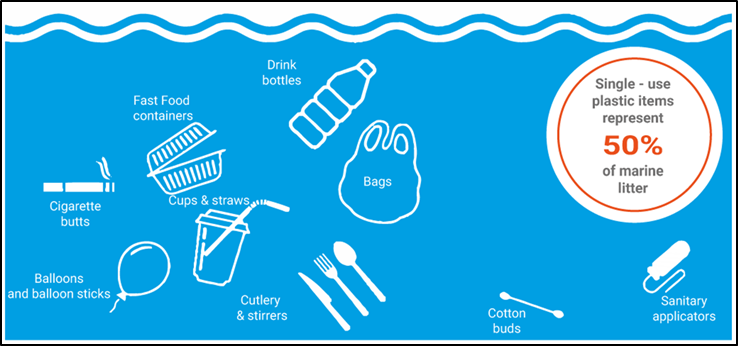In News:
- The Central government has announced a ban on single-use plastic from July 1, 2022.
What’s in today’s article:
- About single-use plastics (How it is made, why it is bad, etc.)
- News Summary (Ban on SUP, how it will be implemented, other measures by Gov., etc.)
In Focus: Single-use plastics (SUP)
- Single-use plastics are goods that are made primarily from fossil fuel–based chemicals (petrochemicals) and are meant to be disposed of right after use.
- Single-use plastics are most commonly used for packaging and serviceware such as bottles, wrappers, straws, and bags.
- A 2021 report by an Australian organization said single-use plastics account for a third of all plastic produced globally, with 98% manufactured from fossil fuels.
- Single-use plastic also accounts for the majority of plastic discarded – 130 million metric tons globally in 2019.
Why is it bad?

- Petroleum based plastic is not biodegradable and usually goes into a landfill where it is buried or it gets into the water and finds its way into the ocean.
- Although plastic will not biodegrade (decompose into natural substance like soil) it will degrade (break down) into tiny particles over the years.
- In the process of breaking down, it releases toxic chemicals (additives that were used to shape and harden the plastic) which make their way into our food and water supply.
- On the current trajectory of production, it has been projected that single-use plastic could account for 5-10% of greenhouse gas emissions by 2050.
SUP in India
- India used 18.45 million tonnes of plastic in the year 2018, according to industry estimates. The plastic produced in the same time period was 17 million tonnes.
- According to a TERI report, published in 2018, average per capita consumption of plastic in India is about 11kgs. It would increase to 20 kgs by 2022.
- Only 60% of the total plastic waste is being recycled.
- Plastic Waste Management Rules 2016 mandated the producers and brand owners to devise a plan in consultation with the local bodies to introduce a collect-back system.
- This system is known as the Extended Producers Responsibility (EPR).
- However, collection efficiency is poor in India.
News Summary:
- The Ministry for Environment, Forest and Climate Change had issued a gazette notification in 2021, announcing the ban on single-use plastic.
- The ban includes manufacture, import, stocking, distribution, sale and use of single use plastic items.
- The ban will come into effect from July 1, 2022.
- The Central Pollution Control Board (CPCB) has defined the list of items that will be banned from the above-mentioned date.
- Items included in the banned list are – plastic sticks, cutlery items, packing/wrapping films, etc.
How will the ban be enforced?
- The ban will be monitored by the CPCB from the Centre, and by the State Pollution Control Boards (SPCBs) that will report to the Centre regularly.
- Directions have been issued at national, state and local levels — for example, to all petrochemical industries — to not supply raw materials to industries engaged in the banned items.
- Local authorities have been directed to issue fresh commercial licenses with the condition that single-use plastic items will not be sold on their premises.
- Existing commercial licenses will be cancelled if they are found to be selling these items.
- Those found violating the ban can be penalized under the Environment Protection Act 1986 – which allows for imprisonment up to 5 years, or a penalty up to Rs 1 lakh, or both.
Impact on the Industry:
- Companies said the imposition of the ban from 1 July would lead to several challenges such as supply constraints and making arrangements for alternative items, such as imported paper straws, as well as an increase in costs.
- Action Alliance for Recycling Beverage Cartons (AARC), which represents Coca-Cola India, PepsiCo India, Parle Agro, Dabur, Diageo and Radico Khaitan, among others, said the transition could lead to losses of Rs 3,000 crore in sales for the industry.
Other measures taken by the Government:
- The Ministry had already banned polythene bags under 75 microns in September 2021, expanding the limit from the earlier 50 microns.
- From December 2022, the ban will be extended to polythene bags under 120 microns.
- The ban is being introduced in phases to give manufacturers time to shift to thicker polythene bags that are easier to recycle.
- According to the Plastic Waste Management Rules, 2016, there is also a complete ban on sachets using plastic material for storing, packing or selling gutkha, tobacco and pan masala.
How foreign countries are dealing with single-use plastics?
- Earlier this year, 124 countries, parties to the United Nations Environment Assembly, including India, signed a resolution in this regard.
- The resolution draws up an agreement which will in the future make it legally binding for the signatories:
- To address the full life of plastics from production to disposal, and
- to end plastic pollution.
- Bangladesh became the first country to ban thin plastic bags in 2002.
- New Zealand became the latest country to ban plastic bags in July 2019. China issued a ban on plastic bags in 2020 with phased implementation.
- As of July 2019, 68 countries have plastic bag bans with varying degrees of enforcement.









